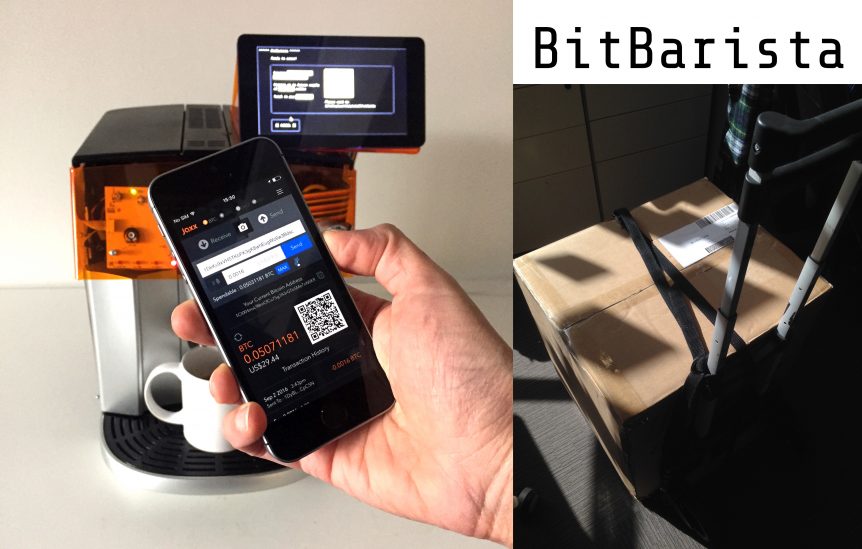Archive, Article
Bitbarista goes out to work
Design Informatics’ very own Bitcoin coffee machine has gone out to work for the first time. Equipped with its own Bitcoin wallet and a degree of autonomy, Bitbarista is ready for life in the real world. It was installed in the office of Wallet.Services at Edinburgh’s Codebase creative hub, on the 15th of March for a two-week study period, and we are anxiously monitoring its activities to see how it’s getting on. Out usage log suggests that all is well. We are excited to hear feedback from the generous and kind staff at Wallet.Services in due course.
Bitbarista is a Bitcoin coffee machine, designed and built, as part of the STiPS project, to demonstrate the properties and potential of Bitcoin, and explore perceptions of value transactions with a novel Internet of Things device. It’s comprised of a hacked Delonghi coffee machine enhanced with a Raspberry Pi which reads signals from the coffee machines sensors, controls its functions, and connects it to the Internet. It is also fitted with a small camera to read smart codes so it can make Bitcoin payments directly to customers’ Bitcoin wallets. This enables it to offer payment to customers for performing maintenance tasks such as refilling coffee beans, filling its water tank, and cleaning out used coffee grounds.
Bitbarista serves coffee in exchange for a Bitcoin contribution towards its future coffee supply. Coffee beans used to make the coffee served will have been selected collectively by previous customers. In order to assist customers in considering future supplies Bitbarista displays data on the state of coffee-producing countries looking for information on climate, work conditions, political situation, infrastructure, price stability and demand, which the machine purportedly browses online. From this data the machine selects top-ranked options for coffee beans in 4 categories: best quality, lowest price, lowest environmental impact and highest social responsibility. It then offers users the opportunity to choose one of these options for its next supply, and customers pay for their coffee accordingly. After the purchase, a new screen situates the choice within the pool of choices previously made, all anonymised, displaying the supply most likely to be ordered next. The aim of this interaction is to create transparency around the process of engaging with coffee supply chains, with the intention of creating a positive experience of data sharing in this context.
A study of initial perceptions of Bitbarista was conducted in August 2016, and the results of this will be published in the forthcoming paper “BitBarista: Exploring Perceptions of Data Transactions in the Internet of Things” at ACM CHI 2017 in May 2017 (this paper will be available form the ACM digital library http://dl.acm.org after this time).These early results suggest that people are positive around sharing data regarding transactions with relevant parties, provided they feel it’s for a good cause, and where they might benefit from this with a personalised service.
The purpose of the current study is to explore reactions to longer term use in a real world setting. Wallet.Services will be the first of several offices in which Bitbarista will be installed. Its next assignment will be to serve coffee in the recently opened uCreate makers space located in Edinburgh University’s main library, which provides services to a diverse variety of projects both internal and external to the university. This study will not only suggest a variety of technical tweaks necessary to increase Bitbarista’s robustness, but will also begin to reveal how people really feel about making coffee choices based on the dynamic, bigger picture of coffee production and supply with which they are engaging, rather than their own immediate desires. Bitbarista offers a new model of business, where is connects customers more directly with the growers and the circumstances of the produce they are paying for. We will explore the different aspects of value this might produce, and see how it affects coffee purchasing behaviour. We will also explore reactions to and perceptions of the machine itself, in particular we are interested in its autonomy. What does it mean to do business with a machine? Can a machine really work for itself? And what decisions might it make in the future?
You can see a short video of Bitbarista in use here https://youtu.be/aac3Vx54F6E , and you can contact e.tallyn@ed.ac.uk for updates on its progress in the real world and any other information.

